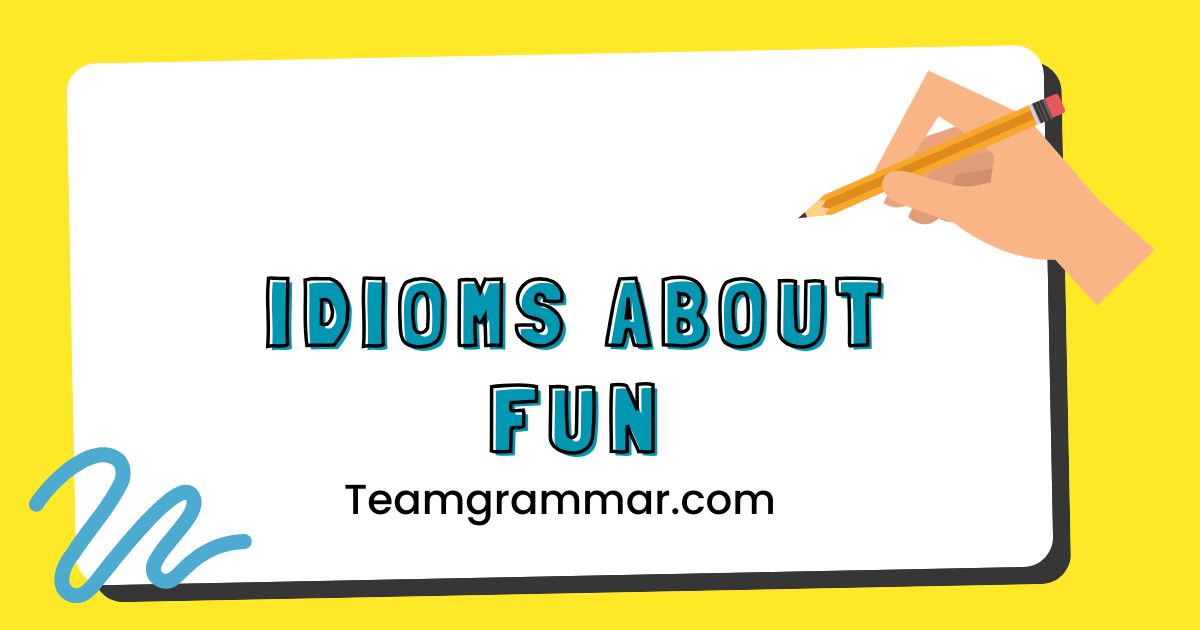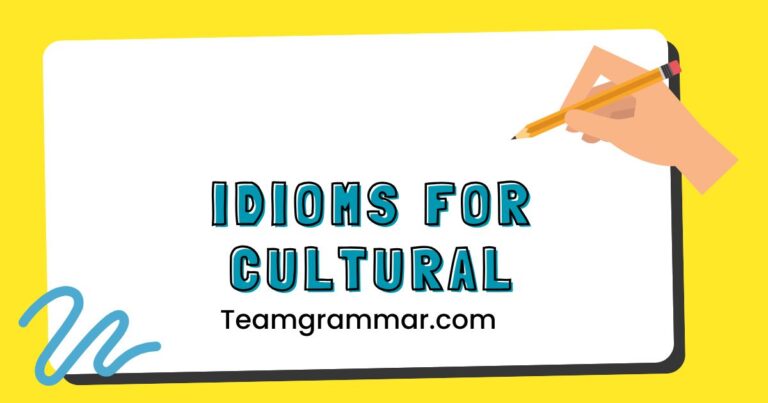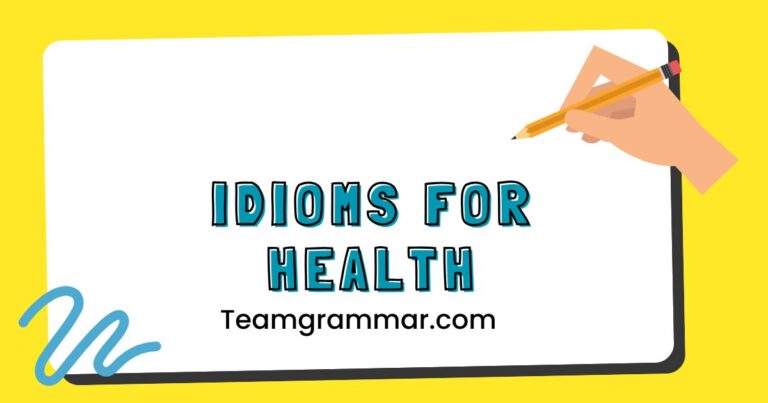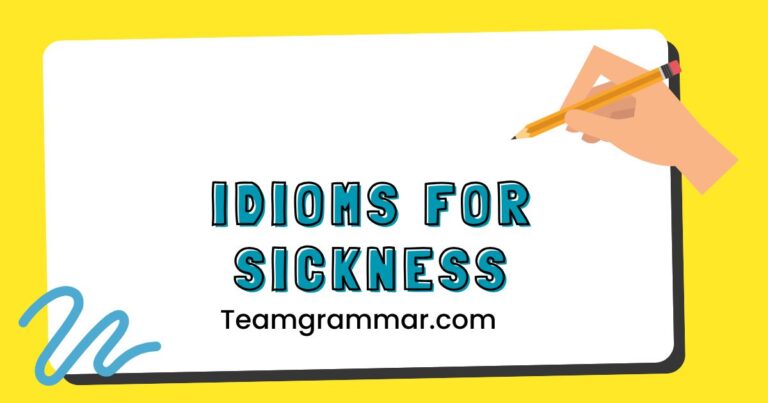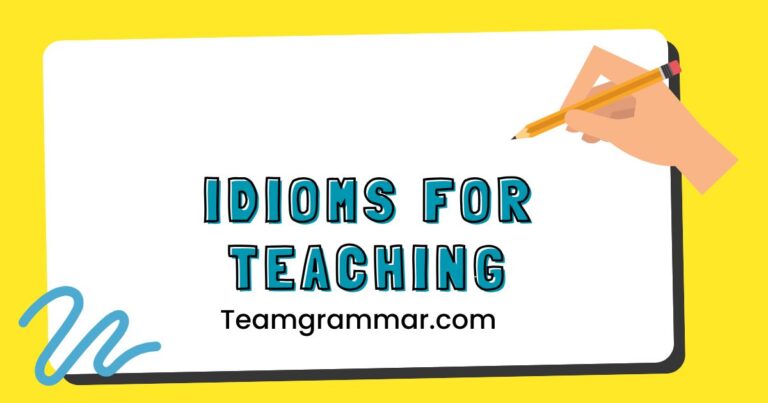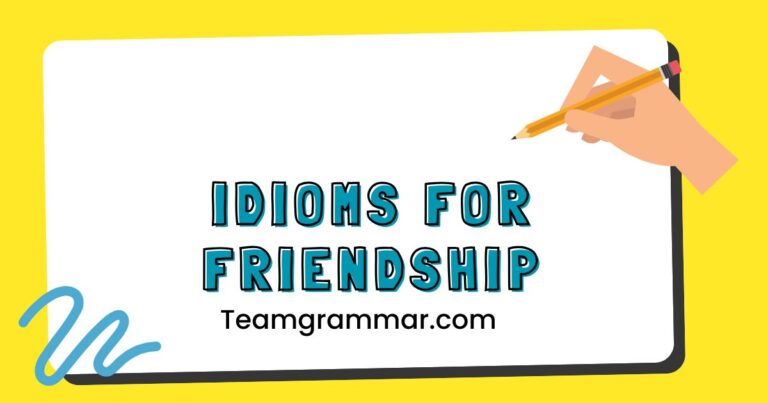47 Idioms About Fun: Mastering English Expressions
Idioms add color and depth to the English language, making conversations more engaging and relatable. Understanding idioms about fun is crucial for anyone looking to improve their English fluency and comprehension.
This article provides a comprehensive guide to common idioms related to fun, offering definitions, examples, usage rules, and practice exercises. Whether you’re an English language learner or a native speaker aiming to enhance your vocabulary, this guide will help you master these playful expressions and use them confidently in your daily communication.
Table of Contents
- Introduction
- Definition of Idioms About Fun
- Structural Breakdown of Idioms
- Types and Categories of Fun Idioms
- Examples of Idioms About Fun
- Usage Rules for Fun Idioms
- Common Mistakes with Fun Idioms
- Practice Exercises
- Advanced Topics
- FAQ
- Conclusion
Introduction
Idioms are phrases or expressions whose meanings cannot be understood from the literal definitions of the individual words. They are a fundamental part of English, enriching communication and providing cultural context.
Learning idioms, especially those related to enjoyable activities and experiences, helps learners understand nuances and connect with native speakers on a deeper level. This article will guide you through the world of “fun” idioms, offering clear explanations, practical examples, and helpful tips for effective usage.
By mastering these expressions, you’ll be able to express yourself more vividly and understand others more effectively.
Definition of Idioms About Fun
Idioms about funare expressions that describe enjoyable experiences, leisure activities, or the general concept of having a good time. These idioms often use figurative language to convey a sense of amusement, excitement, or pleasure.
Unlike literal phrases, the meaning of an idiom is not immediately obvious from the individual words it contains. Therefore, it’s essential to learn the specific meaning and context in which each idiom is used.
These idioms are classified as figurative language and function to add color and emphasis to descriptions of enjoyable activities.
Classification of Idioms
Idioms can be classified in several ways, including:
- Metaphorical Idioms: These use a comparison to convey meaning (e.g., a barrel of laughs).
- Binomial Idioms: These consist of two words joined by a conjunction (e.g., fun and games).
- Phrasal Verb Idioms: These combine a verb and a preposition or adverb (e.g., kick back).
Function of Idioms in Language
The primary function of idioms is to add color and expressiveness to language. They allow speakers to convey complex emotions and ideas in a concise and memorable way.
Idioms also serve a social function, helping to build rapport and establish a shared understanding between speakers. When used correctly, idioms can make conversations more engaging and help speakers sound more natural and fluent.
Contexts for Using Fun Idioms
Idioms about fun are used in a variety of contexts, including:
- Casual Conversations: Describing weekend plans or pastimes.
- Informal Writing: Blogs, personal emails, and social media posts.
- Storytelling: Adding vivid descriptions of characters and events.
- Humorous Situations: Emphasizing the lightheartedness of a situation.
Understanding the appropriate context is crucial for using idioms effectively and avoiding miscommunication. Consider your audience and the overall tone of the conversation before using an idiom.
Structural Breakdown of Idioms
Idioms, at their core, are phrases or expressions. Understanding how they are constructed helps in recognizing and using them correctly.
Here’s a structural breakdown:
Components of Idioms
Idioms typically consist of several components:
- Words: The individual words that make up the idiom.
- Structure: The order in which the words are arranged.
- Meaning: The figurative meaning that is different from the literal meaning.
For example, in the idiom “to paint the town red,” the words “paint,” “town,” and “red” individually have their own meanings, but together they form an idiom that means to go out and have a lively time.
Common Structural Patterns
Several structural patterns are common in idioms:
- Verb + Noun: Hit the town, paint the town red.
- Prepositional Phrases: Full of beans, on cloud nine.
- Similes: As happy as a clam.
- Binomial Pairs: Fun and games, rest and relaxation.
Recognizing these patterns can help you identify and understand new idioms more easily.
Transformations and Variations
While idioms are generally fixed expressions, some can undergo slight transformations to fit different grammatical contexts. For instance:
- Tense Changes: “He is having a whale of a time” can become “He had a whale of a time.”
- Pronoun Changes: “Let your hair down” can be adapted to “She let her hair down.”
Types and Categories of Fun Idioms
Idioms about fun can be categorized based on the specific aspect of enjoyment they describe. Here are some common categories:
Idioms Describing General Enjoyment
These idioms express a general sense of happiness and pleasure.
- Have a blast: To have a great time.
- Have a whale of a time: To enjoy oneself immensely.
- Be on cloud nine: To be extremely happy.
- Full of beans: To be energetic and lively.
Idioms Related to Exciting Activities
These idioms describe activities that are thrilling and enjoyable.
- Paint the town red: To go out and enjoy oneself in a lively way.
- Hit the town: To go out for entertainment.
- Living it up: Enjoying a luxurious or exciting lifestyle.
Idioms About Relaxation and Leisure
These idioms refer to activities that are calming and restful.
- Kick back: To relax and take it easy.
- Take it easy: To relax and avoid stress.
- Chill out: To relax and calm down.
Idioms Related to Humorous Situations
These idioms describe situations that are funny and amusing.
- A barrel of laughs: Very funny.
- In stitches: Laughing uncontrollably.
Examples of Idioms About Fun
This section provides extensive examples of idioms about fun, categorized for clarity. Each table includes the idiom, its meaning, and example sentences to illustrate its usage.
General Enjoyment Idioms
The following table illustrates idioms that describe general enjoyment.
| Idiom | Meaning | Example Sentence |
|---|---|---|
| Have a blast | To have a great time. | We had a blast at the amusement park yesterday. |
| Have a whale of a time | To enjoy oneself immensely. | They had a whale of a time on their vacation in Hawaii. |
| Be on cloud nine | To be extremely happy. | She’s on cloud nine after getting engaged. |
| Full of beans | To be energetic and lively. | The kids are full of beans after their nap. |
| Tickled pink | To be very pleased or amused. | She was tickled pink by the surprise party. |
| In seventh heaven | To be extremely happy. | He’s in seventh heaven since he got his new job. |
| Living the dream | To be living a perfect and ideal life. | After retiring and moving to the beach, he’s really living the dream. |
| A load of fun | Very enjoyable. | The class trip was a load of fun for all the students. |
| Get a kick out of | To find something amusing or enjoyable. | I get a kick out of watching comedy movies. |
| Be in good spirits | To be cheerful and happy. | Everyone was in good spirits at the holiday party. |
| Grin from ear to ear | To smile widely and happily. | She was grinning from ear to ear when she received the good news. |
| On top of the world | Feeling extremely happy and successful. | After winning the championship, the team felt on top of the world. |
| Like a kid in a candy store | Very excited and happy to be surrounded by appealing things. | He was like a kid in a candy store when he entered the gaming convention. |
| Happy camper | A person who is content and satisfied. | Since she got the promotion, she’s been a happy camper. |
| Laugh your head off | To laugh very loudly and heartily. | We laughed our heads off during the stand-up comedy show. |
| Jumping for joy | To be extremely happy and excited, often expressed physically. | She was jumping for joy when she heard she got accepted into her dream university. |
| Beam with joy | To show great happiness and pleasure through one’s expression. | The parents were beaming with joy as they watched their child graduate. |
| Have the time of your life | To experience a period of great happiness and enjoyment. | They had the time of their lives backpacking through Europe. |
| Living high on the hog | To live extravagantly and enjoy luxuries. | After winning the lottery, they started living high on the hog. |
| Having a field day | To have a great time doing something that one enjoys, often at someone else’s expense. | The reporters were having a field day with the celebrity’s embarrassing mistake. |
Exciting Activities Idioms
The following table illustrates idioms that describe exciting activities.
| Idiom | Meaning | Example Sentence |
|---|---|---|
| Paint the town red | To go out and enjoy oneself in a lively way. | They decided to paint the town red after their graduation ceremony. |
| Hit the town | To go out for entertainment. | Let’s hit the town this weekend and see a show. |
| Living it up | Enjoying a luxurious or exciting lifestyle. | Since getting the promotion, he’s been living it up. |
| Go wild | To behave in an unrestrained or uncontrolled manner. | The crowd went wild when their favorite band came on stage. |
| Let loose | To relax and allow oneself to behave freely. | After a long week of work, it’s good to let loose and have some fun. |
| Cut loose | To free oneself from inhibitions and enjoy oneself. | At the party, she decided to cut loose and dance the night away. |
| Make whoopee | To celebrate exuberantly. | The team decided to make whoopee after winning the championship. |
| Step out | To go out for a short time, especially for pleasure. | Let’s step out for some fresh air and a quick walk. |
| Whoop it up | To celebrate or enjoy oneself noisily and enthusiastically. | The fans were whooping it up after the victory. |
| Have a fling | To have a brief and casual romantic relationship. | She decided to have a fling during her summer vacation. |
| Get a buzz out of | To get a feeling of excitement or enjoyment from something. | He gets a buzz out of riding his motorcycle. |
| Take in the sights | To visit and look at the interesting places in a location. | When we travel, we love to take in the sights. |
| Live it up | To enjoy life to the fullest, often spending money freely. | They decided to live it up on their vacation in Las Vegas. |
| Go on a spree | To engage in an unrestrained activity, especially spending money. | She went on a shopping spree after getting her bonus. |
| Have a ball | To enjoy oneself greatly. | We had a ball at the costume party. |
| Go on a tear | To engage in a period of wild or reckless behavior. | After the breakup, he went on a tear for a few weeks. |
| Raise hell | To cause a disturbance or create excitement, often in a mischievous way. | The teenagers were raising hell in the neighborhood. |
| Live on the edge | To live in a risky or daring way. | He enjoys living on the edge by participating in extreme sports. |
| Go bananas | To become very excited or crazy. | The crowd went bananas when the band started playing their hit song. |
| Run wild | To behave in an unrestrained manner. | The children were allowed to run wild in the park. |
Relaxation and Leisure Idioms
The following table illustrates idioms that describe relaxation and leisure.
| Idiom | Meaning | Example Sentence |
|---|---|---|
| Kick back | To relax and take it easy. | After a long day at work, I just want to kick back and watch a movie. |
| Take it easy | To relax and avoid stress. | You’ve been working hard; you need to take it easy this weekend. |
| Chill out | To relax and calm down. | Let’s chill out at the beach this afternoon. |
| Unwind | To relax and reduce stress after a period of exertion or tension. | I like to unwind by reading a book before bed. |
| Take a load off | To relax or rest after being busy or stressed. | Come in and take a load off; you look tired. |
| Hang loose | To relax and not worry about anything. | Just hang loose and enjoy the vacation. |
| Veg out | To relax and do nothing, often watching television. | Sometimes I just want to veg out on the couch all day. |
| Take five | To take a short break. | Let’s take five before we start the next task. |
| Catch some rays | To sunbathe. | We spent the afternoon catching some rays at the beach. |
| Take a break | To stop working or doing an activity for a short time. | You should take a break every hour to avoid burnout. |
| Have a breather | To take a short rest. | Let’s have a breather before we continue hiking. |
| Lounge around | To relax and do nothing much. | We spent the day lounging around by the pool. |
| Put your feet up | To relax, especially by sitting or lying down with your feet supported. | After a long day, I just want to put my feet up and relax. |
| Take time out | To take a break from one’s usual activities. | It’s important to take time out for yourself to prevent stress. |
| Mellow out | To become more relaxed and calm. | He needs to mellow out and not worry so much. |
| Rest and recreation | Activities done for enjoyment and relaxation. | The resort offers various options for rest and recreation. |
| Take a chill pill | To calm down and relax. | You need to take a chill pill; it’s not that serious. |
| Coast along | To proceed without effort or difficulty. | After finishing the project, he could coast along for a while. |
| Ease off | To reduce the intensity of effort or activity. | You need to ease off and give yourself a break. |
| Idle away | To spend time doing nothing. | We idled away the afternoon by the river. |
Humorous Situations Idioms
The following table illustrates idioms that describe humorous situations.
| Idiom | Meaning | Example Sentence |
|---|---|---|
| A barrel of laughs | Very funny. | The comedy show was a barrel of laughs. |
| In stitches | Laughing uncontrollably. | We were in stitches watching the comedian. |
| Crack up | To laugh suddenly and uncontrollably. | The joke was so funny, we all cracked up. |
| Rolling in the aisles | Laughing very hard. | The audience was rolling in the aisles during the slapstick comedy. |
| Splitting your sides | Laughing a lot. | The movie was so hilarious, we were splitting our sides. |
| Dying of laughter | Laughing extremely hard. | We were dying of laughter at his ridiculous antics. |
| A laugh a minute | Very funny and entertaining. | The party was a laugh a minute with all the funny stories. |
| Giggle fit | A bout of uncontrollable giggling. | The silly joke sent her into a giggle fit. |
| Laughing gas | Something that makes you laugh a lot. | The play was like laughing gas; everyone was in high spirits. |
| A riot | A very funny or entertaining person or thing. | The comedian was a riot; we couldn’t stop laughing. |
| Side-splitting | Extremely funny. | The comedian’s routine was side-splitting. |
| A scream | A very funny person or thing. | The party was a scream; everyone had a great time. |
| Funny bone | The part of you that makes you laugh. | He really tickled my funny bone with his jokes. |
| A hoot | A very funny or amusing person or thing. | The entire event was a hoot. |
| In hysterics | Laughing uncontrollably. | The unexpected twist in the movie had us all in hysterics. |
| Belly laugh | A hearty, unrestrained laugh. | His joke elicited a belly laugh from everyone in the room. |
| Chuckling to oneself | Laughing quietly to oneself. | He was chuckling to himself as he read the funny book. |
| A knee-slapper | A very funny joke or story. | That joke was a real knee-slapper. |
| Laugh something off | To treat something as a joke in order to make it seem less serious. | He tried to laugh off his embarrassing mistake, but everyone noticed. |
| Roar with laughter | To laugh very loudly. | The audience roared with laughter at the comedian’s jokes. |
Usage Rules for Fun Idioms
Using idioms correctly involves understanding their specific meanings and the contexts in which they are appropriate. Here are some key usage rules:
Contextual Appropriateness
Idioms are often informal and may not be suitable for formal writing or professional settings. Consider your audience and the overall tone of your communication.
Example: Using “paint the town red” in a business report would be inappropriate, but it’s perfectly fine in a casual conversation about weekend plans.
Grammatical Consistency
Ensure that the idiom fits grammatically within the sentence. This may involve adjusting verb tenses or pronoun agreement.
Example: Instead of saying “He have a blast,” say “He had a blast.”
Avoiding Overuse
While idioms can enhance your language, using too many in a short space can make your speech sound unnatural or forced. Use them sparingly and purposefully.
Example: Instead of saying “I was on cloud nine and having a whale of a time,” simply say “I was very happy.”
Cultural Awareness
Be aware that some idioms may not be universally understood or may have different connotations in different cultures. If communicating with non-native speakers, consider using simpler language.
Example: The idiom “full of beans” might not be understood by someone unfamiliar with British English.
Exceptions and Special Cases
Some idioms have variations or specific contexts in which they are used. Pay attention to these nuances and learn the correct usage through exposure and practice.
Example: The idiom “kick back” generally means to relax, but in some contexts, it can also mean to give someone a share of illicit profits.
Common Mistakes with Fun Idioms
Even advanced learners make mistakes with idioms. Here are some common errors and how to avoid them:
Literal Interpretation
One of the most common mistakes is interpreting an idiom literally. Remember that the meaning of an idiom is figurative and not based on the individual words.
Incorrect: “He was painting the town red” (literally painting buildings).
Correct: “He was painting the town red” (having a lively night out).
Incorrect Word Order
Idioms have a fixed word order, and changing it can alter the meaning or make the phrase nonsensical.
Incorrect: “Have a time of a whale.”
Correct: “Have a whale of a time.”
Mixing Idioms
Avoid combining parts of different idioms, as this can create confusion and sound awkward.
Incorrect: “He was on cloud whale.”
Correct: “He was on cloud nine.” or “He had a whale of a time.”
Wrong Prepositions
Using the wrong preposition in an idiom can change its meaning or make it incomprehensible.
Incorrect: “He is on cloud to nine.”
Correct: “He is on cloud nine.”
Incorrect Tense Agreement
Failing to maintain the correct tense can lead to grammatical errors and confusion.
Incorrect: “They will had a blast.”
Correct: “They will have a blast.”
Practice Exercises
Test your knowledge of idioms about fun with these exercises.
Exercise 1: Fill in the Blanks
Choose the correct idiom from the list to complete each sentence.
(have a blast, paint the town red, kick back, be on cloud nine, full of beans)
| Question | Answer |
|---|---|
| 1. We are going to __________ tonight to celebrate our anniversary. | paint the town red |
| 2. After a long week of work, I just want to __________ and relax. | kick back |
| 3. She will __________ when she sees her birthday surprise. | be on cloud nine |
| 4. The children are __________ this morning after a good night’s sleep. | full of beans |
| 5. We __________ at the party last night. | had a blast |
| 6. After getting engaged, she ______. | was on cloud nine |
| 7. The kids always ______ at the water park. | have a blast |
| 8. Time to ______ and enjoy the weekend! | kick back |
| 9. Let’s ______ for your birthday! | paint the town red |
| 10. The puppy is so ______ this morning! | full of beans |
Exercise 2: Match the Idiom to Its Meaning
Match each idiom with its correct meaning.
| Idiom | Meaning |
|---|---|
| 1. A barrel of laughs | (c) Very funny |
| 2. Have a whale of a time | (a) To enjoy oneself immensely |
| 3. Chill out | (d) To relax and calm down |
| 4. Living it up | (b) Enjoying a luxurious or exciting lifestyle |
Answers:
1 – c, 2 – a, 3 – d, 4 – b
Exercise 3: Use the Idiom in a Sentence
Write a sentence using each of the following idioms.
| Idiom | Example Sentence |
|---|---|
| 1. Hit the town | We decided to hit the town and see a movie. |
| 2. Take it easy | You should take it easy this weekend and get some rest. |
| 3. Get a kick out of | I get a kick out of watching stand-up comedy. |
| 4. Let your hair down | It’s important to let your hair down and have some fun sometimes. |
| 5. Go bananas | The crowd went bananas when the singer came on stage. |
Advanced Topics
For advanced learners, exploring the nuances and origins of idioms can provide a deeper understanding of the English language.
Tracing Idiom Origins
Many idioms have historical or cultural origins that shed light on their meanings. Researching the etymology of idioms can be a fascinating way to enhance your understanding.
Example: The idiom “paint the town red” is believed to have originated in 1837 when the Marquess of Waterford and his friends painted buildings in Melton Mowbray with red paint after a night of revelry.
Regional Variations in Idioms
Idioms can vary significantly between different regions and dialects of English. Be aware of these variations and avoid using idioms that may not be understood by everyone.
Example: The idiom “full of beans” is more common in British English than in American English, where “full of pep” might be used instead.
Idioms in Literature and Media
Analyzing how idioms are used in literature, movies, and TV shows can provide valuable insights into their usage and cultural significance. Pay attention to the context and the characters who use them.
Example: Authors often use idioms to create vivid imagery and convey the personalities of their characters.
FAQ
- What is the difference between an idiom and a proverb?
An idiom is a phrase whose meaning cannot be understood from the literal definitions of its constituent words, while a proverb is a short, well-known saying that expresses a general truth or piece of advice. Idioms are more about figurative language, whereas proverbs offer wisdom or guidance.
- How can I improve my understanding of idioms?
Read widely, listen to native speakers, and make a habit of noting down new idioms you encounter. Use flashcards or a vocabulary journal to review them regularly. Practice using idioms in your own speech and writing to reinforce your understanding.
- Are idioms used in formal writing?
Generally, idioms are more common in informal writing and speech. In formal writing, it’s best to use clear, direct language. However, some idioms are widely understood and accepted in certain formal contexts.
- Can I create my own idioms?
While it’s possible to create new phrases, they won’t be considered idioms until they are widely adopted and understood by a community of speakers. Idioms gain their meaning through common usage and cultural context.
- How do I know when to use an idiom?
Consider your audience, the context of the conversation, and the overall tone. If you’re unsure whether an idiom is appropriate, it’s best to err on the side of caution
and use more direct language.
- Is it okay to modify idioms slightly?
While some idioms can be modified to fit different tenses or contexts, it’s generally best to use them as they are. Excessive modification can make the idiom unrecognizable or change its meaning.
- How are idioms different from metaphors?
A metaphor is a figure of speech that directly compares two unrelated things to suggest a similarity, while an idiom is a phrase with a fixed, non-literal meaning. Metaphors are often more flexible and can be created spontaneously, whereas idioms are established expressions.
- Why are idioms so difficult to learn?
Idioms are challenging because their meanings are not predictable from the individual words they contain. Learning idioms requires memorization and an understanding of cultural context.
- What resources can I use to learn more idioms?
There are many online dictionaries, language learning apps, and textbooks that focus on idioms. Additionally, watching English-language movies and TV shows, and reading books and articles, can expose you to idioms in context.
- How can I practice using idioms?
Try incorporating idioms into your daily conversations, write short stories or dialogues using idioms, or find a language partner to practice with. The more you use idioms, the more natural they will become.
Conclusion
Mastering idioms about fun can significantly enhance your English language skills, making your conversations more colorful and engaging. By understanding the definitions, usage rules, and common mistakes associated with these expressions, you can use them confidently and effectively.
Remember to consider the context, avoid overuse, and be mindful of cultural differences. With consistent practice and exposure, you’ll be able to incorporate idioms about fun seamlessly into your daily communication, adding depth and personality to your language.

